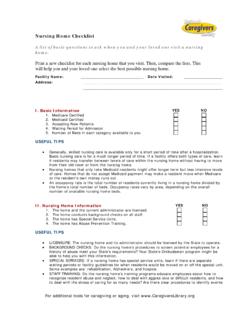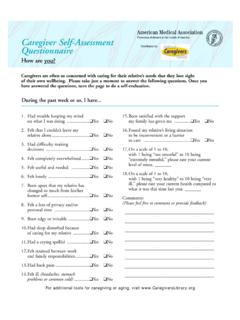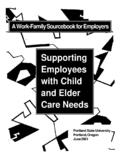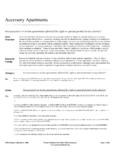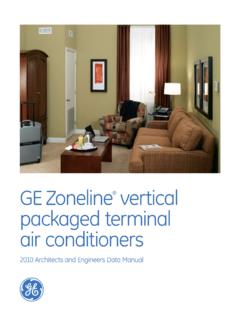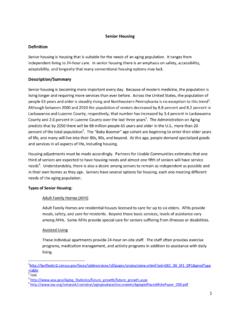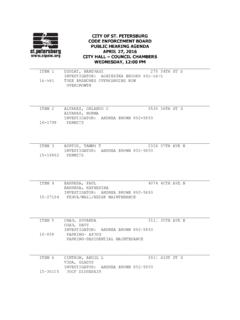Transcription of Glossary - Caregivers Library
1 Glossary accessory Apartment Created when a single-family home is modified to include a complete, private apartment for use by an older person, or when an elderly person converts part of his or her own home into an accessory Apartment for use by another person. accessory Units Private housing arrangements in, or adjacent to, existing single-family homes. See Also: accessory Apartment, Elder Cottage. Activities Of Daily Living (ADL) Basic activities such as bathing, dressing, using the toilet, eating, and moving from one place to another. Acute Care Medical treatment for individuals with short-term illnesses or health problems. Acute Care Facilities Hospitals that mainly serve persons with short-term health problems. Advance Medical Directives Legal documents that specify a person s desires for medical treatment. Advance Medical Directives are drawn up before a person becomes too ill to make competent decisions.
2 See Also: Living Will, Durable Power of Attorney for Health Care. Adult Family Homes Residential homes licensed to care for multiple residents. They provide room, board, laundry, supervision, assistance with Activities Of Daily Living, Personal Care, and social services. Some provide Nursing Care. Also called Adult Foster Care. Adult Residential Care Facilities Licensed boarding homes. They provide room and board and help with medications and Personal Care. Residents may have limited supervision. Advocate A person who speaks up and fights for another person s rights. Assessment A professional review of a person s needs that is performed by a Case Manager or Private For additional tools for caregiving or aging, visit Manager. Together, the Case Manager and family decide what kind of treatment and supports, if any, are needed. Assisted Living Facility A licensed boarding home that offers private apartments.
3 This service emphasizes privacy, independence, and personal choice. Services include meals, Personal Care, medication assistance, limited supervision, organized activities, and limited Nursing Care. Biological Therapy Treatment to stimulate or restore the ability of the immune system to fight infection and disease. Also called Immunotherapy. Cancelable An insurance contract that may be terminated by the insurance company or the insured person at any time. Most insurance is cancelable. See Also: Guaranteed Renewable Caregiver A person who provides needed help to an aging or infirmed loved one. Caregivers may supply emotional support, physical assistance, financial assistance, and many other types of care. Care Plan A comprehensive treatment plan developed by a Caregiver and/or a Private Care Manager. The plan establishes goals and details appropriate treatment and services to meet an elderly, ill, or disabled person s special needs.
4 Case Coordination And Assistance A social service that helps Caregivers and their loved ones obtain public benefit information. Case Manager A professional who help Caregivers identify their loved ones needs. Case Manager also organize and coordinate care services, and help Caregivers access appropriate services, benefits, and entitlements. Also called Care Coordinator, Advocate, and Facilitator. Case Management Or Care Coordination A system in which a single professional is responsible for ensuring that a recipient obtains the full range of required services. Catastrophic Health Insurance Health Insurance that provides protection against the high cost of treating severe or lengthy illnesses or disability. For additional tools for caregiving or aging, visit The use of drugs to treat a chronic illness, especially cancer. Chronic Care Care and treatment provided to individuals with long-term, continuing health problems.
5 Rehabilitation facilities, Nursing Homes, and mental hospitals may be considered Chronic Care facilities. Chronic Disease A disease that (a) is permanent; (b) leaves residual disability; (c) requires special patient rehabilitation; or (d) requires a long period of supervision, observation, or care. Community-Based Care The blend of health and social services available to individuals or families in their local community. Companion A Home Care Worker who provides Personal Care, light housework, exercise, companionship, and medication reminders. These aides usually work for a lower salaries in exchange for room and board. Also called a Live-In. Comprehensive Health Insurance A broad form of Health Insurance that provides coverage for almost all types of medical expense with few internal limits, usually subject to a Deductible. Also called Comprehensive Major Medical. Continuing Care Facility Offers a variety of independent living arrangements for residents, together with medical and Nursing Care, full dining accommodations, and educational, recreational, and social activities.
6 Residents usually pay a sizable entrance fee as well as a substantial monthly charge in return for the use of facilities and services. Continuum Of Care A term that implies the full range of treatments and services that an elderly, ill, or disabled person needs as his or her situation changes. Co-Payment/Co-Pay A type of cost sharing where insured persons pay a specified amount per unit of service or unit of time such as $10 per doctor visit or $5 per prescription and an insurer pays the rest of the cost. The co-payment is due at the time the service is used. The amount paid does not vary with the cost of the service. For additional tools for caregiving or aging, visit Residential Treatment Services Short-term, round-the-clock help provided in a non-hospital setting during a crisis. The purpose of this care is to avoid inpatient hospitalization, to help stabilize the situation, and to determine the next appropriate step.
7 Dedicated Alzheimer/Dementia Unit A distinct section or unit within a licensed Long-Term Care Facility specifically for residents with probable diagnoses of Alzheimer s disease and related dementias. Patient care and daily activities are specifically tailored to address the special needs of these residents. Deductible The amount an insured person must pay before payment for covered services begin. For example, an insurance plan might require the insured to pay $250 of covered expenses before the insurance company will begin payment. Disability Income Insurance A form of Health Insurance that provides periodic payments to replace income lost when the insured person is unable to work as a result of sickness or injury. Discharge Planner A hospital staff member who helps plan for a patient s return to the home or who helps coordinate a move to a new living facility after a person has been in the hospital.
8 Discharge Planners can answer questions about insurance and other financial issues, and can arrange for a variety of support or rehabilitation services. Durable Medical Equipment And Supplies In general, any medical equipment that is (a) prescribed or ordered by a doctor; (b) medically necessary; (c) appropriate for use in the home; and (d) able to be used over and over again. Some supplies that aren t reusable, such as needles and syringes, may also be considered Durable Medical Equipment. Durable Power Of Attorney A legal document giving one or more people the authority to handle finances, property, or other personal matters for another person. The Durable Power Of Attorney is considered a better tool for Caregivers than a basic power of attorney because it remains in effect even if the person granting the power becomes incompetent. Durable Power Of Attorney For Health Care A Durable Power Of Attorney that allows one person to make medical decisions for another.
9 Also called a Health Care Proxy or Health Care Power of Attorney. Elder Cottage A small detached home used by an older person, which is temporarily sited on private For additional tools for caregiving or aging, visit that contains the primary residence of a younger family member. Elder Cottages provide security and privacy for the older person and facilitate the caregiving efforts of the younger family members. Emergency And Crisis Services A group of services available 24 hours a day, 7 days a week, to help during an emergency. Examples include telephone crisis hotlines, crisis counseling, Crisis Residential Treatment Services, crisis outreach teams, and crisis Respite Care. Enhanced Adult Residential Care Adult Residential Care that also offers limited Nursing Care. Face Amount In a Life Insurance policy, the death benefit stated on the first page of the policy. Fee-For-Service A method of billing for health services where a physician charges separately for each patient visit or service rendered; it is the method of billing used by the majority of physicians.
10 Friendly Visiting A service that provides person-to-person social contact that prevents isolation for older people who live alone. Grace Period A period of time (commonly 30-31 days) after a premium due-date during which an insurance policy remains in force even though the premium has not been paid. Guaranteed Renewable An insurance policy that remains in effect as long as the premiums are paid. The insurance company can raise the cost, but cannot cancel coverage. See Also: Cancelable. Health Insurance Insurance against loss by sickness of bodily injury. Health Maintenance Organization (HMO) An organization that provides health care in a specific geographic area, and which accepts responsibility to provide an agreed-upon set of health services to a defined, voluntarily enrolled group of individuals. HMOs are reimbursed through pre-determined, fixed, periodic prepayments without regard to the amount of actual services provided.

